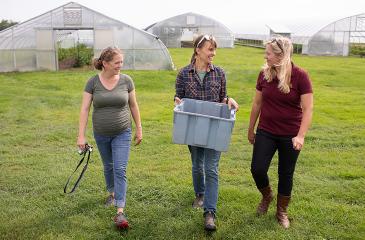The University of Minnesota Extension has established connection to the people of this state for 112 years, reaching more than one million people annually. It can be thought of as the roots and branches of the University “tree.” The roots are trusting relationships built by understanding the needs of the communities and helping people improve their lives, and they extend throughout the state and around the world. The branches carry University research and specialized assistance back to these communities, offering support and education exactly when and where it is needed.
The unique role Extension plays in our state, combined with their historical mission of building a better future using science-based knowledge and training, offers enormous potential for collaboration with the health sciences. Extension is already in every county, with regional offices across the state, and sixty-five percent of its faculty and staff working in Greater Minnesota.
The College of Pharmacy, Duluth, is collaborating with Extension on community-based solutions to the opioid crisis in rural Minnesota. Together, they partner with communities in Aitkin, Pine, Itasca, and northern St. Louis Counties, as well as the Bois Forte and Mille Lacs Band of Ojibwa. Focused on reducing the stigma of substance abuse and creating recovery-friendly communities, they provide education and resources in parenting, housing, finance, mental health, and nutrition. The members of the American Indian Resource and Resiliency Team are tribal members who have trusted relationships and understand disparities within the communities, and have been able to build on their community's strengths in culturally informed ways.
Extension is a fantastic resource and potential partner for building long-term relationships with communities to improve health outcomes for Minnesotans everywhere. I encourage you to take a deeper look at their programs to identify opportunities for collaboration (and take a moment to delve into their history with the link at “112 years” above).
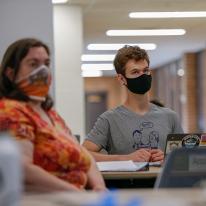
Mask Requirement in Health Sciences Facilities
As a reminder, a mask requirement remains in place within health sciences buildings until further notice. People are required to wear masks in areas in which patients could be present (i.e., main thoroughfares including the 2nd floor concourse of WDH/Moos/PWB/Mayo, elevators, stairwells, clinical areas), and indoors if they are not fully vaccinated (per President Gabel's guidance).
DRIVING INNOVATION AND DISCOVERY

Call for Applications: OACA Faculty Research Development Grant Program
The Office of Academic Clinical Affairs is soliciting applications for OACA Faculty Research Development grants that will support new or expanding interdisciplinary research which addresses significant clinical issues, is innovative, and has a high potential for return on investment (e.g., new NIH awards). Applications can encompass a continuum from laboratory research to community-engaged/community-based research. The Competitive LOI Deadline is Aug. 27. Contact Lauren Bigalke at [email protected] with questions.
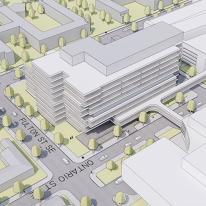
Help Imagine Future Potential for the Health Discovery Hub
The University’s pre-design planning for the Health Discovery Hub, a new facility to house clinical research was paused during the COVID-19 pandemic. Today we find ourselves in a new era based on all we learned in research conducted during 2020. Building on those lessons—and thinking forward to a technology-enabled, highly accessible, and engaging clinical research future—our academic clinical affairs focus is on gathering significant information and input to reimagine a hub to support discovery for the health and wellbeing of our communities. Share your feedback on the Health Discovery Hub.
ADVANCING INTERPROFESSIONAL EDUCATION & TRAINING
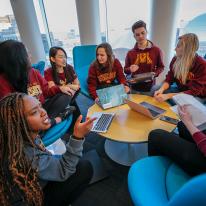
Call for Faculty: Geriatric Case Competition
Faculty are invited to be coaches or judges for the fall 2021 virtual Interprofessional Geriatric Case Competition. The competition is a unique opportunity for graduate and undergraduate students from multiple disciplines and schools at the University of Minnesota to come together as a team to develop a comprehensive, interprofessional plan of care for an older adult. The Interprofessional Geriatric Case Competition is approved as part of the 1Health interprofessional education curriculum at the University of Minnesota. Faculty are asked to consider offering optional credit or up to 12 clinical hours in their fall 2021 course syllabus for students to participate in the case competition. Questions? Please contact [email protected].
PARTNERING WITH COMMUNITIES
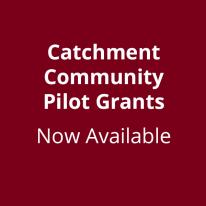
Masonic Cancer Center Catchment Community Pilot Grants
The objective of the Catchment Community Pilot Grant program is to provide pilot funding to support community-engaged research projects. Projects must be conducted within a partnership between community-based organizationsand academic researchers working to address one of the Cancer Center’s catchment priorities. LOIs due Sept. 15.
U-WIDE EVENTS AND OPPORTUNITIES
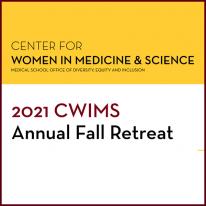
2021 CWIMS Annual Fall Retreat
Join the Center for Women in Medicine & Science on Sept. 23 for the annual fall retreat. The topic will focus on connecting in the midst of disillusionment to lead towards empowerment. This event has multiple aims including: updating the University community on CWIMS and gender equity initiatives carried out over the past year, fortifying networks (both internal and external), fostering robust collaborations with OACA programs/centers, external Universities and External Advisory Board members by inviting them to be presenters, and hosting a visiting speaker that presents on a skill-based topic (e.g., negotiation, leadership).
